The Jungle Techno Connection - Interview with british producer Ron Wells
Wednesday, November 13, 2024
by Tat
The first few years of the 1990s were arguably the most important years for urban British music. Acid House had faded away and a new generation of British producers were making their own unique sounds away from the heady influence of the U.S. One such producer was Ron Wells, AKA Jack Smooth among other aliases. His early works showed that the British could produce credible Techno that would stand the test of time with the Smooth & Simmonds productions as a primer for what came next. Yet it was the harder sound that Ron would become more renowned for as he championed the embryonic Jungle, Breakbeat and Hardcore scenes. Since then he has gone on to produce dozens of records as a solo artist and collaborator across multiple genres from his Sound Entity studio.
This summer you released a mammoth compilation of 46 tracks you created between 1989 and 1991 on Bandcamp called ‘The Early Years’. They’ve all got the trademark draft names producers might have used such as ‘DAT Jam 1’ and ‘Tape Jam 17’. How come some of these never formally got released? And was this one of those Covid, Lockdown projects that brought them to light?
I mainly did that to increase the catalogue on my Bandcamp page, as it currently only represents a tiny portion of my work. I had kept cassette tapes from day one of producing in 1989, so those tracks were my learnings. I guess I wanted to show how naïve I was. I started out with no music knowledge at all. I didn’t know what or where Middle C was. But I think I learned fairly quickly as it was a matter of weeks after getting my first equipment that I had a record out. For whatever reason at the time I would have thought they weren’t right for release, so they have sat on those tapes for decades.
You have been very open about these tracks, in that it was part of a learning process and that you cringe at some productions from back then. Nevertheless they really reflect a lot of what was going on at the time and the sound we hear in lots of today’s music. Are there any which you’ve thought about going back to and recreating, reconstructing or remixing?
On that compilation I completely remade the Wax Factory Four Seasons and Pucker Tunes Eps. I did it because I didn’t have good recordings, but I still have all the original sequencer disks and the same synths and drum sounds. Because of this, I was able to get them almost identical, but I sped them up a few BPMs as I always felt they were a little bit slow.
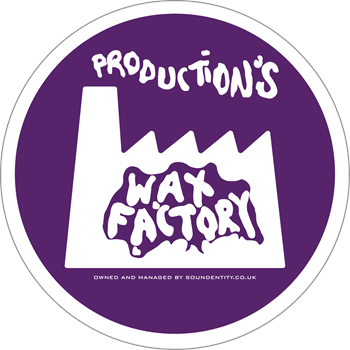
Was Wax Factory the result of wanting somewhere to release the tracks you felt were ready to share wider?
I was a clueless 19-year-old and didn’t know how to approach record labels to get signed, and my music was very raw and basic back then; so it probably wouldn’t have appealed to the bigger, well known labels. When I found out how relatively easy it was to get records made, starting a label seemed the fastest and easiest way to get my music out there. The only rejection I had to deal with was my own track selection. Back then it was easy to sell a few thousand copies on wax and make a quick return – all of which I used to help fund Sound Entity Studio.
Unlike a lot of the releases coming out of the UK at the time, the Smooth & Simmonds releases seemed a lot more authentic and proper. What was influencing you at the time? Was there one particular artist or label that you saw as a blueprint?
My influences were always Kraftwerk, Electro, House and Techno, but I was also big into Soul and 80s Groove, Funk and Rare Groove before the House era. In the late 80s I was buying loads of Trax Records, Nu Groove, etc. I really liked Acid House and deep, futuristic Techno, so I think I tried to fuse them together but my Rare Groove and Funk influences got me into adding breakbeats into the mix as well. Obviously others were doing similar things before me and I just wanted to feel like I could match the sound of my peers and my peers to me were mainly in the USA. I thought at the time that UK House often didn’t sound really authentic, and I wanted people to think I was American, and many did. I used to get contacted by DJs and labels in the States, which was for me a sign I was on the right path and just needed to improve. I was lacking in musical skill and winging it a bit though, to be honest, but I’ve always been grounded that way. Listening to Jazz always resets ego.
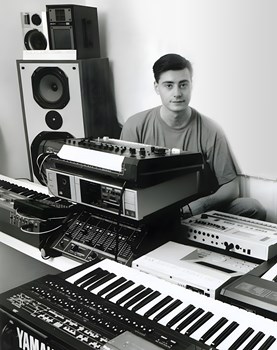
Then Jungle Techno happens. For many of us in Sheffield, we recall hearing the first use of the term locally in the early 1990s in the legendary Occasions club when Top Buzz were playing. It was clear back then how impactful it was going to be as it travelled from the south. What was the catalyst for that sound?
I think I’ve possibly answered some of what you ask above, but I have an admittedly highbrow description of what I call Jungle Techno. For me it is deep Techno, sped up with breakbeats added. It should be composed on synths with minimal sampling (like Kraftwerk), it should sound deep and emotional, it should have iconic Techno stab riffs, powerful 808 or 909 drums and multiple layered breakbeats. It should have layers of music that take you on a journey through light and shade. “Dark, yet somehow euphoric, with an alien-like intelligence” is how I describe the sonic goal, and it’s great on the occasions where I feel I managed to attain that. I think it’s probably the sound I was attempting to make from day one of producing, but I needed to learn how to pull things like that off. Like all genres, Jungle Techno was a collection of like minded people and we built a mini-scene that sadly didn’t last as long as it should have, because there was a powerful movement away from 4/4 kicks into Jungle and DnB. The music was becoming more accomplished with some people noticing it was going to cause them problems if it got much more sophisticated – and so a large part of the scene went into Amen Brother with just a few noises – a sound I couldn’t really buy into. I just kept on doing my thing and held on for as long as I could but once I dropped the 4/4 kicks, my music pretty much sounded like Atmospheric (Intelligent) DnB by default and so the timing ended up working well as it happened. This is because my tunes are usually full of atmospheric pads, dreamy and enchanting parts in any case. Since the last eight years there has been quite a strong revival for Jungle Techno with many people getting the equipment I used, so they can create similar vibes. It’s great to see and hear, as I don’t think the limits were properly explored before the scene moved away from it. It’s also great to see Atmospheric DnB making a great comeback too. I think the standard of music within my circles is strong at the moment with many artists doing great things.
This was quite a radical change for yourself to move from what you were doing via Wax Factory? Was that influenced by the wider change in rave music, in that it was getting harder?
Interestingly you say above it was a big departure, but if you play Techno Driven from the Pucker Tunes EP, I’d say that was early Jungle Techno, it was just slower. Also Energy from one of my early Sound Entity EPs is very much on that pathway. So what happened to me is, I could hear the scene getting harder and faster. I just kept working on my Techno, Acid, House tracks and made that harder and faster. That’s pretty much how Hardcore was born. Some of us were Techno heads and some were Hip-Hop heads, we all influenced each other. I was producing every day with different artists and DJs so I was right on the pulse of change. Tempos were going up about 3 BPM a week until we found ourselves at 150 BPM and counting. I always thought 150-155 was ideal, since DJs could plus 8 the record if needed. We had influences from House, Techno, Acid, Hip-Hop, Funk, etc mangled together furiously, and then a short time after the Ragga influence came in too. There were lots of sub-genres and influences to choose from. But Techno will always be number one for me.
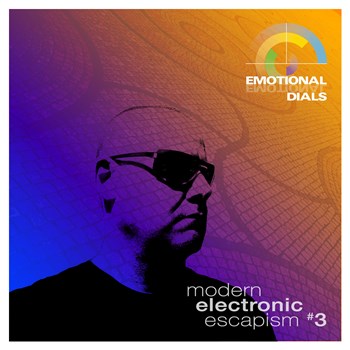
Atmospheric drum & bass soon followed, which must have been a natural progression given your techno foundations?
My music was very atmospheric by default, so dropping 4/4 kicks put me there without much deviation… I kind of happily landed there. So yes it felt natural, but I did miss my 909 kicks for a while.
You launched your own Sound Entity label in 1991 and with that your Jack Smooth alias. The label was quite prolific for a couple of years and then ceased in the mid 90s to return in 2017 with a lot of your own productions and collaborations. A lot of these are represses of previous productions. Are there plans to repress more of your old productions?
I’ve probably repressed all of my most sought after music already, so barring a few that might get done, I’ll be focusing on writing new music for the foreseeable future. When I get a visit from the note fairies, I go in the studio and work my ideas up. When the note fairies are away I stay well clear of the studio, to avoid making bad music.
There’s also your RonWellsJS releases which dropped in 2017 on the label. Some of which are a nod back to your early techno and house roots. Are there plans for similar releases?
Absolutely yes, without compromise. I will always make the early sounding stuff. I like my music to sound nostalgic, but timeless – which I don’t always manage, but that’s always the goal.
You’ve appeared on a lot of different labels, from Junior Boys Own to XL, from Craigie Knowes to Basement. Despite your leanings towards jungle and hardcore, you can pretty much turn your hand to any style. Is there one particular genre that if you had the time, you would explore a lot more?
I’m lucky that I’m retired and so don’t need to make a living from music anymore. So everything I do is what I want to do. All the genres I work in are the ones I love, and I can divide my time and effort into any of those as long as the note fairies are in town. So as long as it is, what I might describe as, “originally composed, deep, emotional electronic music”, I’ll always be trying to write my best version of what that means to me, until I am no longer able to.
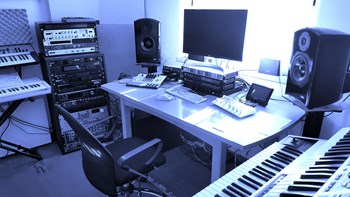
Since starting your Sound Entity studio back in the early 1990s, how has your approach to making music changed since then?
I don’t think it has much, apart from how much easier it is with unlimited technology helping with production quality. I can see, hear and do anything easily in Cubase, as opposed to the two line LCD on my Roland MC300 sequencer and Ensoniq ASR-10 sampler. I had to do everything by ear back then. Now it is literally 10x easier. The composition and production technique is basically the same, but with better tools. One thing I don’t miss is not having total recall, nowadays I can just load anything up and carry on working on it. Everything I use has full recall, but 90% of what I do is all ‘in the box’, with my hardware generally sitting there doing nothing other than to make the studio look like a studio. I could never go back to the days of analog desks and synths that don’t store patches, etc. I don’t want anything to do with it. Life’s too short, and these days analog doesn’t even sound better, it just sounds different… and it’s a difference I can well live without. You can’t tell the difference in the mix, and even if you can, it’s subtle at best, compared to digital in capable hands.
Is there one thing you wish you knew back then, that you know now?
Quickly identify toxic traits in people and then avoid them. The industry is full of unsavoury characters and you must navigate around these people. There are also some really fantastic people. Recognise those good traits and promise yourself to seek great people out, because you will be much happier and more successful, limiting yourself to working with and socialising with genuine people. And, if you can DJ or play live then you should probably do it, because the industry likes and pays performers better. I dropped DJing the moment I could produce, which ultimately held me back, but at least my ears are undamaged.
You’ve produced and remixed 100s of records over the last 35 years, is there one particular track which has stood out above the others and made you wish it was your own?
Not really, I’m usually more proud of individual parts within tracks, rather than the whole tune. The work that goes into creating an iconic sound or riff is what I look back on fondly. So my ‘Plight Of The Innovators’ stab sound and riff is something I’m very fond of and that sound probably defines me to date.
You started out as a pirate radio DJ and continue to play out. Ideally what kind of sets do you prefer playing?
If I DJ (not often, but I get asked a bit) it’s usually Jungle Techno, or a mix of Techno, Acid and House.
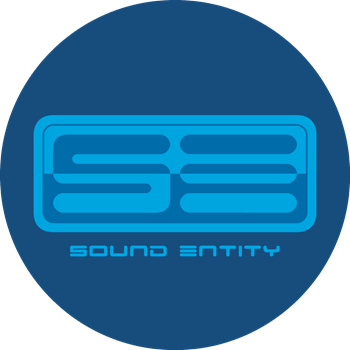
Going forward, you clearly aren’t slowing down. What’s next for Ron Wells?
Just more of the same, I still haven’t attained the sound I’m aiming for, so I’ll just keep on chipping away for as long as I can.
What’s the one tune that never leaves your record box?
Because I don’t DJ very much at all I don’t really have a record box. In reality, I think it’s generally understood that I’m a producer foremost and so if I’m asked to DJ and I accept I’m usually expected to play my own music, as if it’s kind of a PA, done with either CDJs or turntables. But back in the day when I was a DJ, it would have been something like ‘Sueno Latino’, ‘Night Writers – Let The Music Use You’, or Phuture’s ‘We Are Phuture’.
https://www.soundentity.co.uk/
https://emotionaldials.bandcamp.com/
https://www.facebook.com/Original.J.Tek/
https://www.facebook.com/ron.wells.jack.smooth
Discover new digital dance music with Trackhunter









